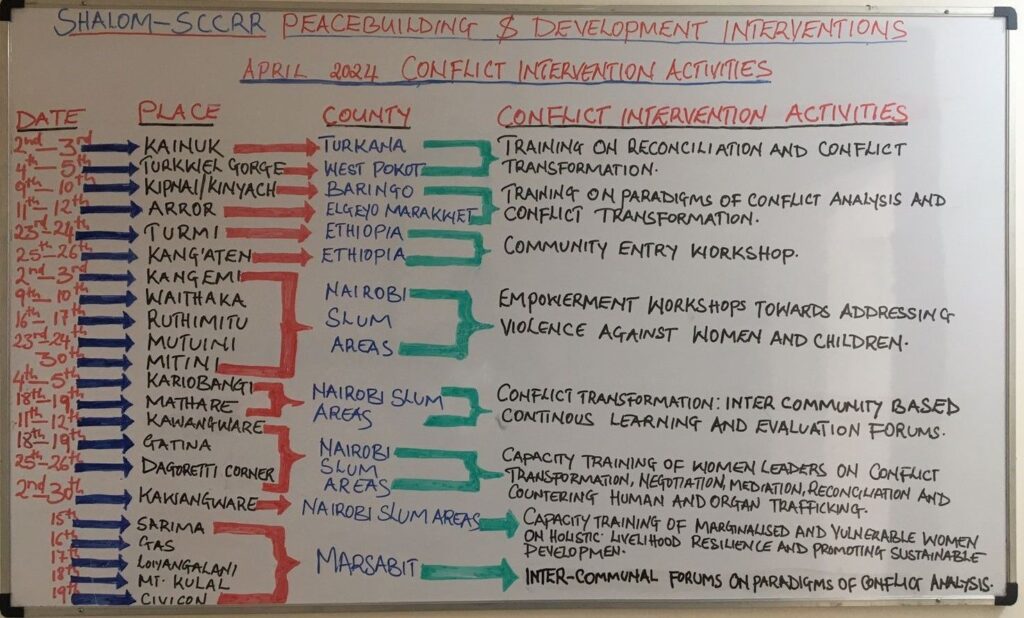By Godfrey Okoth
Kibera is an informal settlement in Kenya’s capital city Nairobi and the largest informal settlement in Africa. It is claimed to be home to almost million people coming from the different ethnic communities in Kenya. Some of the major ethnic communities that live in Kibera are the Nubians, the Kikuyu, the Luo, Luhya and Kamba.
Communities living in Kibera have time and again suffered from interethnic clashes which often emanate from ethnic tensions that result from political incitements and competition for the limited resources especially land. Residents of the sprawling slum live in very dilapidated conditions characterized by lack of clean water, lack of proper housing, poor drainage, and lack of proper sanitation among others. Other problems such high levels of unemployment, illiteracy and poverty have compelled most young people to seek alternatives in criminal activity so that they can be able earn their daily living.
While many have given up on hope for Kibera, not so the Shalom Center for Conflict Resolution and Reconciliation. The often-heard cry of despair – “what the hell can be done!” – only inspires Shalom to join some great Kibera people who have not lost hope to declare: “we will not accept despair and we can overcome together.”
The unfavorable living conditions coupled by the undying tensions between ethnic communities have created a society which is characterized by frequent attacks and eruptions of open violence between rival ethnic communities. In this environment where killing and maiming have for long been the order of the day, economic activities have failed to make steady progress. In recognition of the fact that positive peace is the key to long term development and a healthy social co-existence, Shalom was invited by the communities to empower them to transform the structures that have been associated with the perennial conflict in Kibera. This has been accomplished through equipping these communities at the grassroots level with the skills of prevention, management and long term transformation of conflict. Shalom has been motivated to work from the grassroots because through research and frequent baseline surveys, and SCCRR established that local community leadership have the greatest potential to influence public opinion in Kibera. This informed Shalom’s decision to train influential opinion shapers at the grassroots level with a clear expectation that they will make use of the skills they have acquired to transform mentalities of fellow communities towards peace.
Since key among the problems faced by communities in Kibera are negative ethnicity, poverty and political manipulation, Shalom aims at influencing greater social cohesion and positive decision making at the local levels through transforming people’s perceptions so that they are enabled to appreciate ethnic diversity as well as to believe in their ability to be change makers. Shalom has endeavored to assist the communities to diagnose what causes interethnic conflicts among them through a module called Conflict Paradigms. Additionally, Shalom staff has enhanced the ability of community members to take preventive measures before occurrence of conflict through conflict prevention modules such as Conflict Early Warning Signs.
Of great importance has been the training on Prevention of Election Violence which was conducted in 2013 and which helped a great deal in reducing the motivation of the young people to violence in the run up to 2013 elections in Kenya. Other than prevention, Shalom has ensured that the communities in Kibera are better placed to manage and reduce the negative effects of conflict in the event it occurs through trainings on skills of mediation and negotiation. Finally, SCCRR is at the moment carrying out a training on managing Identity Based Conflicts with different community groups in Kibera with the aim of building greater trust between ethnic groups and mending broken relationships. This is intended to act as a springboard towards conducting a series of problem solving workshops among rival ethnic communities. Shalom has indeed managed to train a variety of community groups including women, village elders, youth, local political leaders, local government administrators, peace monitors, and members of the District Peace Committees among others.
Strong improvement in conditions has have been reported ever since SCCRR began working towards peace in Kibera. In particular, the prevention of election violence training was lauded as one of the activities which helped a lot in preventing an outburst of violence in the district. This is because most young people had a chance to attend and be equipped with alternative means of airing grievances in case they are not satisfied with an election outcome.
The workshops on Election Preparedness held in 2012 and Reconciliation after the election workshops held in 2013 had a great influence on one Charles Mwong’ela, a young leader who is now taking what he has learned backed to the people in his community. Since he attended the two initial workshops, Charles got the inspiration to establish youth groups across Kibera to restore relationships which were once broken by ethnic hatred. Through intercommunity activities specifically sports and theatre, the groups have succeeded in bringing together youths from communities that earlier on could not see eye to eye.
With such encouraging successes, Shalom looks at the future with great optimism and looks forward to a day that all communities living in Kibera will stand united in charting their common destiny. Shalom and the people of Kibra will walk and succeed together in being the voice of change in positive action.




